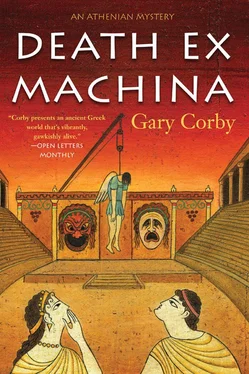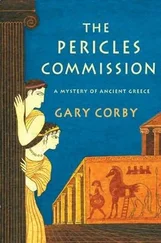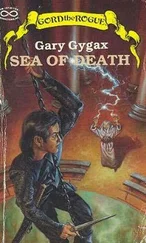Gary Corby - Death Ex Machina
Здесь есть возможность читать онлайн «Gary Corby - Death Ex Machina» весь текст электронной книги совершенно бесплатно (целиком полную версию без сокращений). В некоторых случаях можно слушать аудио, скачать через торрент в формате fb2 и присутствует краткое содержание. Год выпуска: 2015, ISBN: 2015, Издательство: Soho Press, Жанр: Исторический детектив, на английском языке. Описание произведения, (предисловие) а так же отзывы посетителей доступны на портале библиотеки ЛибКат.
- Название:Death Ex Machina
- Автор:
- Издательство:Soho Press
- Жанр:
- Год:2015
- ISBN:978-1-61695-520-5
- Рейтинг книги:3 / 5. Голосов: 1
-
Избранное:Добавить в избранное
- Отзывы:
-
Ваша оценка:
- 60
- 1
- 2
- 3
- 4
- 5
Death Ex Machina: краткое содержание, описание и аннотация
Предлагаем к чтению аннотацию, описание, краткое содержание или предисловие (зависит от того, что написал сам автор книги «Death Ex Machina»). Если вы не нашли необходимую информацию о книге — напишите в комментариях, мы постараемся отыскать её.
Death Ex Machina — читать онлайн бесплатно полную книгу (весь текст) целиком
Ниже представлен текст книги, разбитый по страницам. Система сохранения места последней прочитанной страницы, позволяет с удобством читать онлайн бесплатно книгу «Death Ex Machina», без необходимости каждый раз заново искать на чём Вы остановились. Поставьте закладку, и сможете в любой момент перейти на страницу, на которой закончили чтение.
Интервал:
Закладка:
There are no signs to mark the boundaries of the demes within Athens, but you always know when you’ve stepped from one into another because their characters are quite different. It was only a matter of crossing the southbound road to Piraeus to take us from influential Collytos into downmarket Melite.
Piraeus Way is one of the busiest thoroughfares in Athens: all the commercial traffic from the port to the agora is on that road. The east side is lined with expensive town houses. The west side is lined with houses too, less expensive ones. Diotima and I walked along one of the paths between them into the narrow byways of Melite.
Melite had been the home deme of Themistocles, the great General and traitor whom Diotima and I had met in Ionia. We thought of him as we passed by his old house. A hundred steps further on, we passed the small temple to Artemis that Themistocles had commissioned. It was in a sad state of disrepair; a chipped façade of faded paint and wooden columns with hairline fractures.
In the days of Themistocles he’d seen to it that Melite was the best decked out deme in Athens. Since then Melite had absorbed much of the influx of metics to the city. Several families crammed into buildings that had once housed only one. To make extra room, the men had extended rooms so that they overhung the street or encroached at ground level. Streets that had once been narrow but adequate had become almost impassably narrow and claustrophobic. This change had happened in my own lifetime.
More people meant more sewage. It all went into the open drains that ran down the middle of the street. Combined with the muddy walkways and the second storeys that loomed above, Melite had acquired its own unique aroma.
Diotima and I took care to walk the outer edge of these mean streets, because what floated down the center didn’t bear thinking about.
Naked or ill-clothed children watched us from doorways. Some of them asked for money. A mother told them sternly not to bother the citizens passing by.
Diotima was having none of that. She stopped at the doorway where the mother had issued the rebuke. Diotima glanced at the mother, bent to talk to the snotty-nosed children. She held up three obol coins-half a drachma. It was a paltry sum, but the children’s eyes went round as bowls.
“Do you know a man named Romanos?” Diotima asked them.
The children said nothing, but their eyes never left the coins.
“They don’t, but I do,” their mother spoke up. She was dressed in a chiton of some heavy material and had a weary air.
When the woman said nothing more, Diotima said, “We’d like to find his home.”
The mother thought about it. Then she asked, “How do I know you’ll pay the children when you’re done?”
Diotima handed over the coins on the spot, one to each child. Each clutched the coin to their bosom as if it were their most prized possession.
Their mother said, “I suppose it can’t hurt.” She bent to the children and gave them instructions on where to take us. Having heard her words I could have gone straight there myself, but I wasn’t going to deprive the children of their work.
The children led us deftly down the paths. I guessed the two older for seven and eight, a boy and a girl. The youngest was perhaps five and had to be stopped by his older siblings from playing with the muck in the drains.
They led us left, right, left to the center of the deme, where there was a square, a tiny one from which someone had swept the rubbish. Old women hawked their wares from faded wooden boxes: wilted vegetables, cheap pottery, and good luck amulets. No doubt the sellers weren’t paying the vendor fees with which the city hit the stallholders in the official agora. This was some sort of unofficial agora that had sprung up, discreet enough that the archons probably didn’t even know it existed.
On the opposite corner of the agora was a house, and it was before this that the children stopped. They looked up at us expectantly.
“This is the place?” Diotima asked.
They nodded.
“Thank you.”
They turned to run home.
“Hey, kids!” I called.
They stopped.
“Here,” I said. I handed each of them a full drachma piece. I used my body to block the transaction from idle sight.
“Now I want you to take these to your mother. You’re to give them to her, and nobody but her. And you hide them, right now, you understand?”
I worried that in these parts, there were people who would beat a child for a drachma.
They nodded and three drachmae disappeared beneath three rag-thin tunics. The children might not say much, but they lived on these streets and they weren’t stupid.
“All right. Run.”
They ran.
“Melite’s a lot poorer than it used to be,” I said to Diotima when they were gone. “It wasn’t like this when I was a child.”
“I wouldn’t know,” Diotima said. “I wasn’t allowed out of the house.”
“I probably ran down every street in Athens,” I said. “I remember when they were building most of these places.”
We knocked on the door.
It was opened by a slim young woman.
“Yes?” She peered around the edge of the door, ready to slam it shut.
Her hair was ragged and shorn. The classic signs of bereavement.
I was taken aback.
“I’m sorry,” Diotima said, equally nonplussed. “I see you’re already in mourning.”
“I am?” the young woman blinked at Diotima. The two women looked much the same age. But whereas Diotima was dark, this woman was light skinned with light brown hair.
She realized we were both staring at the top of her head.
“Oh, you mean my hair. It doesn’t mean anything. I’m a professional mourner.”
It was my turn to be surprised. Of course I’d seen professional mourners in the street, but I’d never thought I’d meet one. In every case I’d seen them walking behind a cart upon which a dead person had been laid, on their way to the cemetery at Ceramicus. Mourners were hired by the family, to express their grief, which they did with loud wails, graphic tearing at their hair, and the rending of their clothes.
Until that moment it had never occurred to me that professional mourners must have normal lives, when they weren’t walking behind dead people.
“Then you haven’t heard,” I said, relieved to have solved at least one tiny puzzle.
“Heard what?” she asked.
“That Romanos is dead,” I told her.
The young woman raised her arms to the sky and screamed.
SCENE 15
“Well how was I supposed to know she was his sister?” I protested.
Diotima had spent considerable time listing my various defects: mental, moral, and social. She paid particular attention to my lack of tact.
“Nico, they’re living in the same house. Of course she was a relative of some sort. I thought at first she must be his wife.”
Diotima had had plenty of time to berate me. The woman-her name was Maia-had installed us in the visitor’s room at the front while she went off to inform the rest of the house of the disaster. As she spread the word the wailing rose throughout, until it sounded like a house of madmen. But it wasn’t; it was a house in genuine mourning.
A man entered the room. His hair was freshly cut and ragged.
He greeted us and said, “My name is Petros.” Beneath the sadness his voice was pleasant. “I would offer you refreshments,” he said politely, “but …” His voice trailed away.
“But a house in mourning doesn’t serve refreshments,” I finished for him.
“No. My wife didn’t ask you for details.”
“Your wife?”
“Maia. Romanos is my brother-in-law.”
“I’m sorry.”
Читать дальшеИнтервал:
Закладка:
Похожие книги на «Death Ex Machina»
Представляем Вашему вниманию похожие книги на «Death Ex Machina» списком для выбора. Мы отобрали схожую по названию и смыслу литературу в надежде предоставить читателям больше вариантов отыскать новые, интересные, ещё непрочитанные произведения.
Обсуждение, отзывы о книге «Death Ex Machina» и просто собственные мнения читателей. Оставьте ваши комментарии, напишите, что Вы думаете о произведении, его смысле или главных героях. Укажите что конкретно понравилось, а что нет, и почему Вы так считаете.












